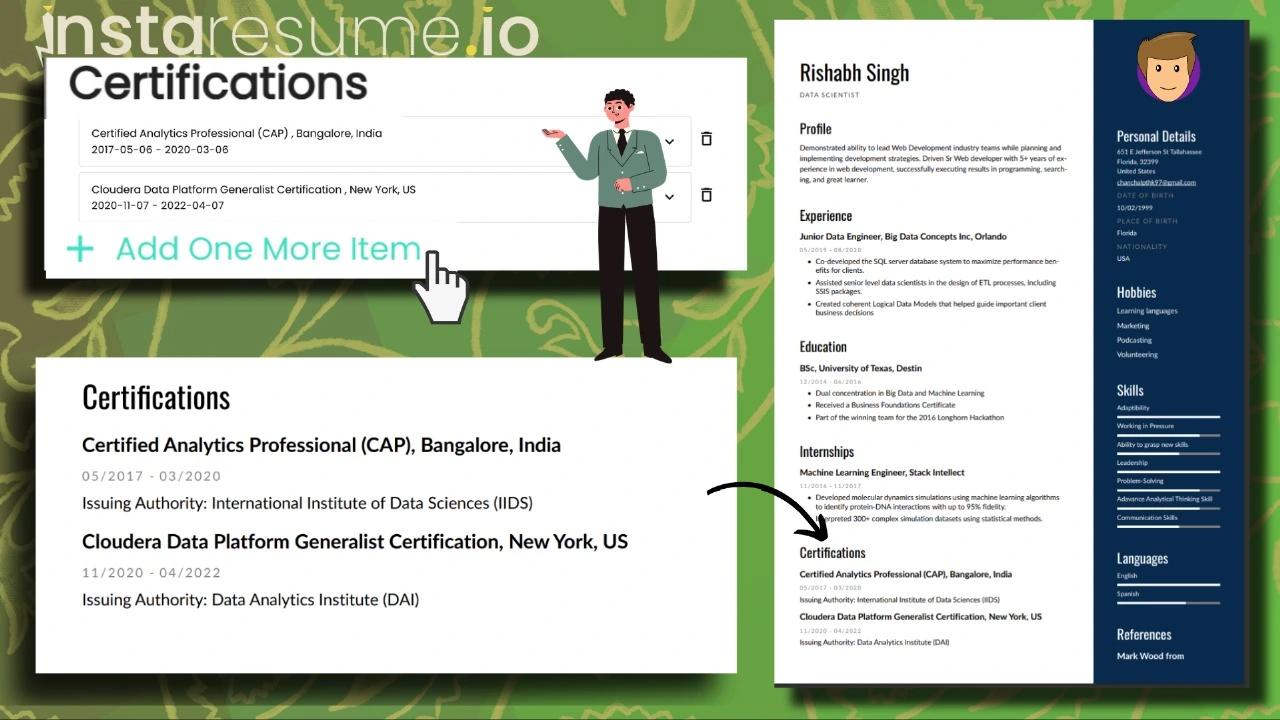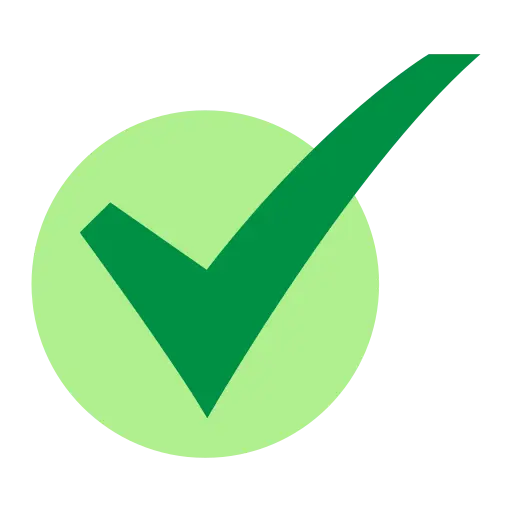How to put certifications on resume
Trust Score: 4.7
366 reviews

Table of Contents
Introduction
In today’s competitive job market, having the right certifications can make all the difference in landing your dream job. Whether you’re a seasoned professional looking to advance in your career or a recent graduate eager to make your mark, highlighting your certifications on your resume can significantly boost your chances of success.
Crafting a resume that strategically incorporates your certifications requires careful planning and attention to detail. From choosing the most relevant certifications to formatting them in a way that grabs attention, there are several key considerations to keep in mind.
In this comprehensive guide, we’ll delve into the art of putting certifications on your resume. We’ll explore why certifications matter, how to select the right ones for your career goals and provide practical tips on where and how to display them for maximum impact.
Let’s dive in!
What are certifications?
Certifications are official documents that validate an individual's skills, knowledge, or achievements in a particular field. They often serve as a testament to your qualifications and expertise, enhancing your credibility and employability. Examples include Coursera courses, Udemy certificates, and AZ-900 certification.
Should certifications be listed chronologically on a resume?
Certifications should be listed in order of relevance rather than strict chronological order. Recent and industry-specific certifications, such as Microsoft certifications or the Harvard Advanced Management Program, should be prioritized.
Can online certifications be listed?
Yes, online certifications from platforms like Coursera and Udemy are valuable, especially if they align with the job requirements. For instance, mentioning a CPR or BLS certification in healthcare roles can be a game-changer.
Tips for organizing certifications
 Create a "Certifications" Section: Label the section clearly on your resume.
Create a "Certifications" Section: Label the section clearly on your resume. Include Credential Details: Add the certification name, issuing organization, and date of completion.
Include Credential Details: Add the certification name, issuing organization, and date of completion. Highlight Relevant Certificates: Place certifications like CompTIA certifications or Red Cross CPR training prominently if they directly pertain to the role.
Highlight Relevant Certificates: Place certifications like CompTIA certifications or Red Cross CPR training prominently if they directly pertain to the role.
When to include certifications on your resume
Certifications can be a valuable addition to your resume when they align with job requirements or enhance your qualifications. They serve as proof of your expertise and dedication to professional development, helping to set you apart in competitive hiring processes. Knowing when to include them ensures your resume is tailored and impactful.
If the employer specifically requires certifications
Many job descriptions list specific certifications as a prerequisite for consideration. For instance, roles in healthcare might require BLS or ACLS certifications, while project management positions often look for a PMP credential. Including these certifications not only confirms your eligibility but also demonstrates that you have the technical knowledge and qualifications the employer prioritizes. Ensure these certifications are prominently displayed in a dedicated section to catch the recruiter’s attention.
To demonstrate industry experience
Certifications validate your expertise and often indicate years of practice or specialized knowledge within a field. They show you are well-versed in industry standards and best practices.
For example, certifications like AWS Certified Solutions Architect or Six Sigma Black Belt not only reflect technical mastery but also your commitment to maintaining high professional standards. This can be particularly advantageous in technical or highly regulated industries, where proven experience is crucial.
To demonstrate additional skills
Adding certifications that reflect supplementary skills can highlight your versatility and willingness to adapt. For instance, a marketer who includes certifications in data analytics or UX design demonstrates a broader skill set. Such certifications showcase your initiative to expand your expertise and make you a more well-rounded candidate. Employers value candidates who proactively enhance their abilities to meet the evolving demands of their industry.
If you have limited practical experience
For recent graduates, career changers, or individuals re-entering the workforce, certifications can bridge the gap between academic knowledge and workplace application. They provide tangible proof of your proficiency and readiness to perform in a professional setting. Certifications like Google Analytics or HubSpot Inbound Marketing can give an entry-level candidate credibility, assuring employers of their capability even without extensive experience.
Importance of certifications on a resume
Certifications hold significant importance on a resume for several compelling reasons:
Validation of skills and expertise:
Certifications serve as tangible proof of your skills and expertise in a particular area. They validate your knowledge and demonstrate to employers that you have obtained a certain level of proficiency in a specific field.
Enhanced credibility
Including relevant certifications on your resume enhances your credibility as a candidate. It shows that you have taken the initiative to acquire additional qualifications beyond your basic education and have invested time and effort into mastering specific skills or knowledge areas.
Competitive advantage
In a competitive job market, certifications can give you a competitive edge over other candidates who may lack similar credentials. They differentiate you from the crowd and make you a more attractive prospect to potential employers.
Alignment with job requirements
Many job postings specify certain certifications as prerequisites or preferred qualifications. By including relevant certifications on your resume, you demonstrate that you meet or exceed the requirements for the position, increasing your chances of being shortlisted for an interview.
Understanding the types of certifications
Certifications can be broadly categorized into several types based on their focus, industry relevance, and the skills they validate.
Industry-specific certifications
 Manufacturing and Engineering: Certifications related to manufacturing processes, quality control, and engineering principles. Examples include Six Sigma Green Belt, Certified Welding Inspector (CWI), and Autodesk Certified Professional (ACP).
Manufacturing and Engineering: Certifications related to manufacturing processes, quality control, and engineering principles. Examples include Six Sigma Green Belt, Certified Welding Inspector (CWI), and Autodesk Certified Professional (ACP). Hospitality and Tourism: Certifications for roles in hospitality management, food safety, and tourism. Examples include Certified Hospitality Supervisor (CHS), ServSafe Food Handler, and Certified Travel Associate (CTA).
Hospitality and Tourism: Certifications for roles in hospitality management, food safety, and tourism. Examples include Certified Hospitality Supervisor (CHS), ServSafe Food Handler, and Certified Travel Associate (CTA).
Soft Skills and Professional Development
 Communication and Leadership: Certifications focusing on communication, leadership, and interpersonal skills. Examples include Dale Carnegie Leadership Training, Toastmasters International certifications, and Emotional Intelligence (EQ) assessments.
Communication and Leadership: Certifications focusing on communication, leadership, and interpersonal skills. Examples include Dale Carnegie Leadership Training, Toastmasters International certifications, and Emotional Intelligence (EQ) assessments. Sales and Customer Service: Certifications demonstrating proficiency in sales techniques, customer service, and relationship building. Examples include HubSpot Inbound Certification, Salesforce Certified Sales Professional, and Customer Experience (CX) Specialist.
Sales and Customer Service: Certifications demonstrating proficiency in sales techniques, customer service, and relationship building. Examples include HubSpot Inbound Certification, Salesforce Certified Sales Professional, and Customer Experience (CX) Specialist.
Language Proficiency Certifications
 Certifications demonstrating proficiency in foreign languages, such as Test of English as a Foreign Language (TOEFL), International English Language Testing System (IELTS), and Diplôme d’Études en Langue Française (DELF).
Certifications demonstrating proficiency in foreign languages, such as Test of English as a Foreign Language (TOEFL), International English Language Testing System (IELTS), and Diplôme d’Études en Langue Française (DELF).
How to include certifications on your resume
Including certifications in your resume requires following specific guidelines to ensure they enhance your profile effectively. Here are key considerations to keep in mind to make sure your certifications add value and are presented appropriately.
Clearly state the certification title
Under the “Certifications” section, use the same font and size as the rest of your resume to list the certification’s full name as a bullet point. Ensure proper spelling and avoid abbreviations; this allows future employers to easily search for the certification if they aren’t already familiar with it.
Mention the certifying organization
To establish credibility, include the name of the organization that issued the certification. Make sure to provide the full name and double-check for any errors. If sending your resume electronically, consider linking to the organization’s website for easy access.
Indicate the date earned
Including the date you received the certification is important for two main reasons. First, it shows your reader how current your qualifications are. Second, it gives them a point of reference for contacting the organization to verify your achievement. If applicable, also list when you last renewed the certification.
Outline the anticipated completion date
If you’re in the process of obtaining a certification, it’s helpful to note the expected completion date on your resume. Be transparent about your progress to give potential employers an idea of how far along you are in the certification journey.
Highlight relevant skills
If space allows and the skills pertain directly to the job you’re applying for, consider adding a brief list of skills linked to the certification. This can clarify the certification's importance and preemptively address potential questions from your audience.
Technical Certifications
Technical certifications validate your expertise and skills in specific technical areas, such as information technology, software development, or engineering. They demonstrate your proficiency in using certain tools, technologies, or platforms, making you more attractive to employers in industries that require technical prowess.
Here are a few examples:
- Cisco Certified Network Associate (CCNA): This certification demonstrates your ability to install, configure, operate, and troubleshoot medium-sized routed and switched networks.
- Microsoft Certified Solutions Expert (MCSE): MCSE certification validates your skills in designing, building, and managing advanced solutions using Microsoft technologies.
- AWS Certified Solutions Architect: This certification proves your expertise in designing distributed systems on the Amazon Web Services (AWS) platform.
Professional Certifications
Professional certifications verify your knowledge and competence in specific fields outside of technical domains. They are often industry-specific and indicate your commitment to adhering to professional standards and best practices.
Here are a few examples:
 Project Management Professional (PMP): PMP certification is widely recognized in project management and demonstrates your ability to lead and direct projects effectively.
Project Management Professional (PMP): PMP certification is widely recognized in project management and demonstrates your ability to lead and direct projects effectively. Certified Public Accountant (CPA): CPA certification is essential for accountants and auditors and signifies your expertise in accounting principles and practices.
Certified Public Accountant (CPA): CPA certification is essential for accountants and auditors and signifies your expertise in accounting principles and practices. Certified Nursing Assistant (CNA): CNA certification is necessary for individuals working in the healthcare field, particularly in assisting nurses with patient care tasks.
Certified Nursing Assistant (CNA): CNA certification is necessary for individuals working in the healthcare field, particularly in assisting nurses with patient care tasks.
In summary, technical certifications focus on validating your technical skills and knowledge in specific areas like IT or software development, while professional certifications attest to your expertise in broader fields like project management or healthcare. Both types of certifications enhance your credibility and marketability in your respective industries.
Formatting and placement within the resume
Including certifications on your resume can enhance your qualifications and demonstrate your expertise in specific areas. Proper formatting and strategic placement of certifications can effectively highlight your skills and attract the attention of potential employers.
Step 1: Open instaresume.io and click on "Create Resume."
Step 2: Choose a template for your Resume from the options provided.
Step 3: Fill in all the details, then navigate to "Add Sections." Select "Custom Section" and list your certifications in bullet points following the suggestions in this blog.
Placement:
 Strategic Positioning: Place certifications strategically within your resume based on their relevance to the job you're applying for. If a certification is highly relevant to the position or industry, consider placing it near the top of your resume, either in the education section or in a separate "Certifications" section.
Strategic Positioning: Place certifications strategically within your resume based on their relevance to the job you're applying for. If a certification is highly relevant to the position or industry, consider placing it near the top of your resume, either in the education section or in a separate "Certifications" section. Near Related Experience: If you have certifications directly related to your work experience, consider including them in the descriptions of relevant jobs. This demonstrates how your certifications have been applied in real-world settings.
Near Related Experience: If you have certifications directly related to your work experience, consider including them in the descriptions of relevant jobs. This demonstrates how your certifications have been applied in real-world settings.
Formatting:
 Clear Heading: Use a clear and concise heading such as "Certifications" to introduce this section of your resume.
Clear Heading: Use a clear and concise heading such as "Certifications" to introduce this section of your resume. List Format: Present certifications in a bulleted list format for easy readability. Include the full name of the certification, the certifying organization, and the date obtained.
List Format: Present certifications in a bulleted list format for easy readability. Include the full name of the certification, the certifying organization, and the date obtained. Relevant Details: Provide additional context for each certification, such as any specialized areas or skills covered by the certification.
Relevant Details: Provide additional context for each certification, such as any specialized areas or skills covered by the certification. Consistent Formatting: Maintain consistency in formatting throughout the certifications section to ensure a professional appearance. Use the same font style, size, and formatting for all certifications listed.
Consistent Formatting: Maintain consistency in formatting throughout the certifications section to ensure a professional appearance. Use the same font style, size, and formatting for all certifications listed. Reverse Chronological Order: List certifications in reverse chronological order, starting with the most recent or relevant certification first. This allows employers to quickly see your most recent accomplishments.
Reverse Chronological Order: List certifications in reverse chronological order, starting with the most recent or relevant certification first. This allows employers to quickly see your most recent accomplishments.
Highlighting Key Certifications
 Emphasize Relevant Certifications: Highlight certifications that are directly related to the job requirements or industry standards. These certifications should stand out prominently on your resume to showcase your qualifications.
Emphasize Relevant Certifications: Highlight certifications that are directly related to the job requirements or industry standards. These certifications should stand out prominently on your resume to showcase your qualifications. Use of Icons or Badges: Consider using icons or badges provided by certifying organizations to visually emphasize your certifications. However, ensure that these visual elements enhance readability and professionalism rather than detracting from it.
Use of Icons or Badges: Consider using icons or badges provided by certifying organizations to visually emphasize your certifications. However, ensure that these visual elements enhance readability and professionalism rather than detracting from it.
Explanation of Acronyms or Abbreviations
 Clarify Acronyms: If the certification is commonly known by its acronym, provide the full name of the certification along with the acronym in parentheses on the first mention. For example: "Certified Information Systems Security Professional (CISSP)."
Clarify Acronyms: If the certification is commonly known by its acronym, provide the full name of the certification along with the acronym in parentheses on the first mention. For example: "Certified Information Systems Security Professional (CISSP)."
FAQs (Frequently Asked Questions)
Should I include all my certifications on my resume?
 While it’s essential to showcase relevant certifications, it’s not necessary to include every certification you’ve ever obtained. Focus on those that align with the job you’re applying for.
While it’s essential to showcase relevant certifications, it’s not necessary to include every certification you’ve ever obtained. Focus on those that align with the job you’re applying for.
Where should I place certifications on my resume?
 Certifications can be listed either in a separate section dedicated to qualifications or within the education or skills section, depending on their relevance and importance.
Certifications can be listed either in a separate section dedicated to qualifications or within the education or skills section, depending on their relevance and importance.
How do I know which certifications are relevant to the job?
 Carefully review the job description and identify the key skills and qualifications required. Choose certifications that demonstrate proficiency in those areas.
Carefully review the job description and identify the key skills and qualifications required. Choose certifications that demonstrate proficiency in those areas.
Should I include expired certifications on my resume?
 It’s generally best to focus on current certifications. However, if an expired certification is still relevant and demonstrates valuable skills, it can be included with a note indicating its expiration date.
It’s generally best to focus on current certifications. However, if an expired certification is still relevant and demonstrates valuable skills, it can be included with a note indicating its expiration date.
Is it necessary to provide details about each certification on my resume?
 While it’s essential to include relevant details such as the certification title, issuing authority, and date of attainment, you don’t need to provide exhaustive information. Keep it concise and focused on highlighting your qualifications.
While it’s essential to include relevant details such as the certification title, issuing authority, and date of attainment, you don’t need to provide exhaustive information. Keep it concise and focused on highlighting your qualifications.







